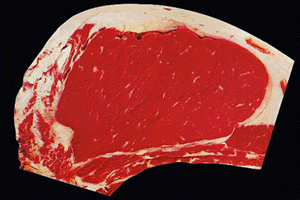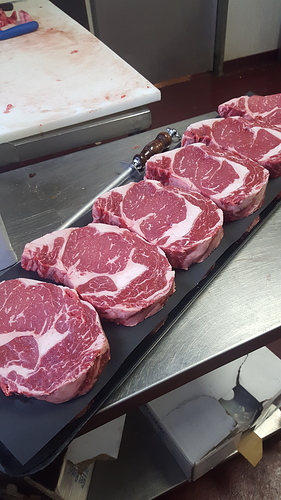Love me some Walmart.
What are your meat money-saving tips?
I don’t have a car and can seldom get to Costco or other cheap supermarkets. I haven’t been to “town” for 3 months.
I buy from local farmers and at my local overpriced general store. Ground beef and ground pork are $7 (Canadian) per pound, and eggs are $6 a dozen. Cheese is about $10 a pound. I buy canned salmon from Amazon, at $3 per tin.
Even so, my meat/eggs/cheese/fish cost for the entire month is under $200 Canadian ($150 US) per month. I have 80 grams of protein per day, and of course zero on fasting days (twice a week, starting last week). I eat very simply. If you find you’re spending too much on groceries, it might be the extras (sauces, nuts, processed meats, prepared foods, etc.).
Fasting for a few days during the week makes choice meats more affordable. I’m currently seeking to marry a butcher’s daughter if anyone knows one.
I work at a local butcher shop and you can absolutely save money going to a local butcher vs a big chain store! The key is to have a good knife and learn to sharpen it. Then buy beef in big bags before they have been trimmed out for steaks or ground into burger. I have been buying bags of chuck tenders (this is what ground burger is made out of) to make into jerkey and stew meat. Can also use them as roasts and small chuck steaks. When you buy in bulk you will often be given a price break. Look into buying chuck roll as well. This is what chuck roasts are cut out of. When there are prime rib sales going on during holidays, buy a big one and cut into steaks for a nice stash of ribeyes.
Well that answers that question. 
Thanks for the tips, will pay a visit to my local butcher instead of the supermarket next time and see what bargains I can discover.
My daddy always told me that the most dangerous thing in a kitchen is a dull knife, and he was right!
This is totally true. I once tried to cut a carrot, in half, longways, with a dull butcher knife and I had one hand on the knife and one to keep the carrot from rolling. The carrot rolled anyway, when I pushed the dull knife into it and the knife cut my left thumb to the bone. Lesson learned.
With keto we don’t have to buy premium cuts. They are “premium” because they tortured the animals and meat to make it low fat. The market, driven by lies, believes “low-fat” is worth the extra money.
My wife is not a keto fan (yet) so we pay the extra money. And than I pay extra again to add fat back in (for energy via olive oil or butter).
If you have time, a freezer and the inclination you could consider buying an entire lamb or something?
I eat canned fish, sardines in water, Alaskan salmon or tuna. With avocado and feta … costs half the price of a Subway or McDonalds lunch.
BTW I don’t get red salmon, even people in the salmon business say pink is as good (historically, before refrigeration, the pink version could go off more easily, but that’s not a problem now).
Can’t agree with ya on that one. But maybe you’re talking about something different than I’m thinking of when I read it.
I live in an area where pastured cattle is everywhere. Good pasture, not feed lots. No torture. They live pretty happy and contented lives. I would guess many would call that “premium” beef. To us, it’s just normal.
Honestly, I have no idea what factory beef is put through on an up close and personal basis. Have driven buy a few of those places and that’s a lot more like torture than the cows I see in the fields surrounding me.
??
Premium isn’t really a term to describe grades of beef. The shop I work at sells Choice or Prime only. There are 4 grades of beef. It simply means they have better fat marbling and more muscle. This is acheived by genetics of the animal moreso than being tortured. I can assure you no one would want to eat a tortured animal because they would taste awful!
Speaking of which, is it true that the cuts of beef etc you see sometimes in supermarkets that are a darker purple colour, means the animal was stressed when it was slaughtered? And as a result it will be a poorer tasting meat?

Here are 2 examples. The first photo is select grade. This is a step above what a beef strictly for burger would be. Very little marbling and fairly tough. Second photo are prime grade ribeyes. Plenty of fat throughout and deliciously tender! 
I heard that said on the 2KD podcast but honestly I have not found that to be true. It is simply meat that has not been exposed to oxygen for long. Grass fed farmers will try to convince you otherwise of course to sell their product. Open up the package and let it sit in open air and it will turn a delightful red. The ones I would avoid are pale looking cuts of meat. They always have a strange odor to them and I can’t help but think the animal was not in the best of health.
A lot of beef in the U.S. is packaged with carbon monoxide. Yes - initial reaction with oxygen gives a bright red color, but over time it will tend toward tan/brown/grey with continued exposure. Carbon monoxide preserves that bright red color for days.
–And actually, carbon monoxide plus myoglobin in blood will give a bright red color too…
One other reason that comes to mind is the animal’s heart stopped beating too quickly and therefore it didn’t bleed out as much as it should have. It’s a dilemma I face when processing my own poultry. Hunters also have this issue with wild game that have not been bled out properly. It is more humane of course to stop all brain activity before bleeding them out but then I have to soak the meat in ice water to drain the rest of the blood if I don’t want it to be slightly “iron-y” in flavor.
The big mocks and rolls are, yes. Once cut, the steaks turn black or grey within 2 or 3 days unless they are wrapped tightly in plastic wrap. I haven’t noticed much of a difference between that and what I butcher at home. It ages in appearance at the same pace.
Hmm, yes we’re speaking of two very different things.
You seem to be thinking of the premium I could only dream of, real proper cows … (all good).
I was speaking of factory cows, produced to be as large as possible, in as short a time as possible, yet as lean as possible - all rather unnatural - yet that kind of meat fetches top dollar in supermarkets near me, they call it “premium” I call it expensive for no good reason.
Sorry I should’ve been clearer …
Nah, no worries. It’s just a thing that crops up on the forums from time to time. Most of the time, the way we view our vocabulary in relation to others is pretty similar. But there are times when two people say the exact same words and have rather dramatically different things in mind. Our background, where we’re from, it all adds up.
Anyway, hope I didn’t offend, certainly didn’t mean to.


 Yep! It’s quite a workout!
Yep! It’s quite a workout!